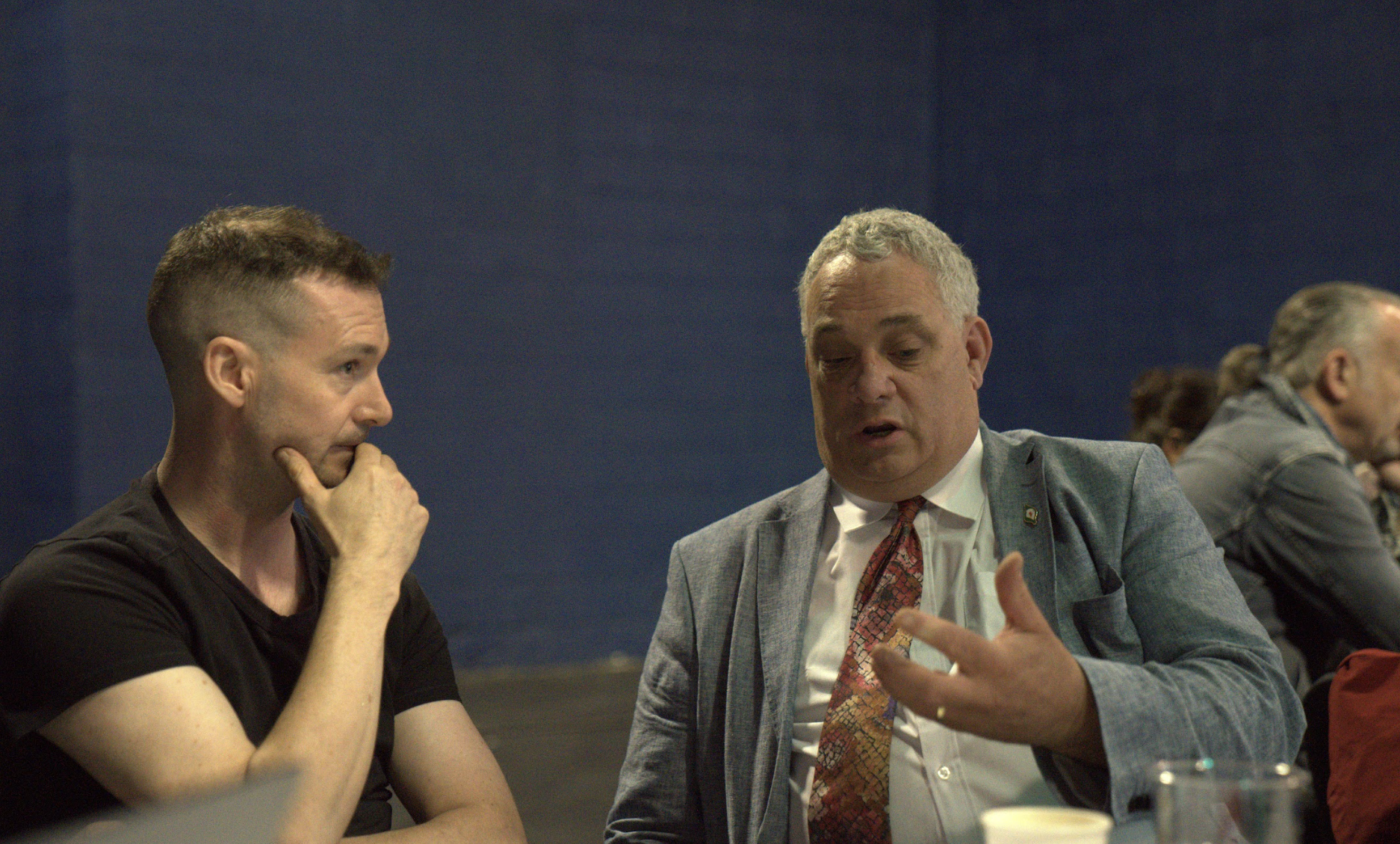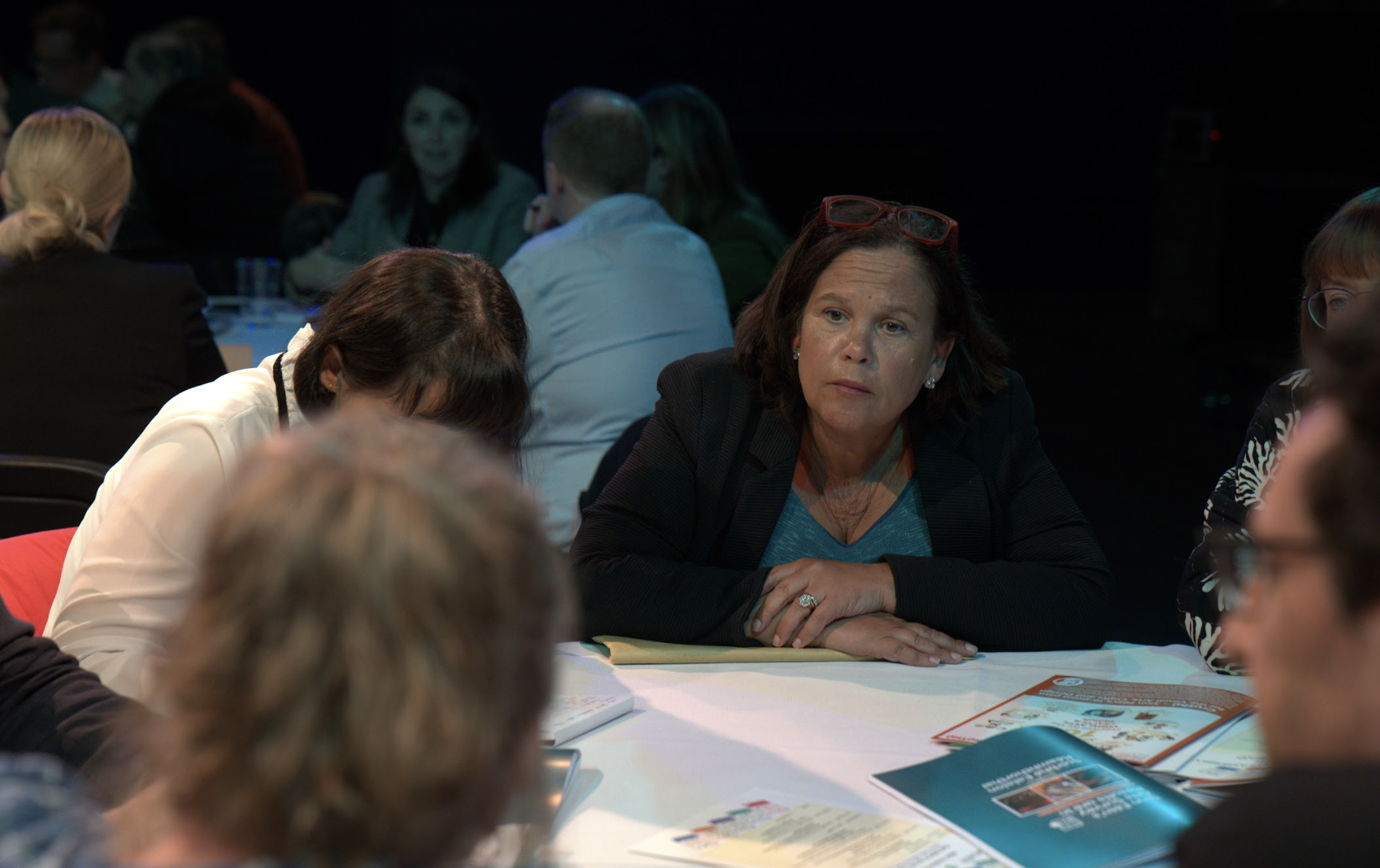- Culture
- 10 Sep 24
Sinn Féin spokesperson for the arts Aengus Ó Snodaigh: "RTÉ has been dysfunctional in terms of the arts for years..."

Sinn Féin spokesperson for Gaeilge, Gaeltacht, Arts, Culture, Tourism and Media, Aengus Ó Snodaigh TD, sat down with Hot Press to discuss some of his party's proposals for revitalising Ireland's arts sector...
An improved Basic Income for Arts scheme, the scrapping of the TV licences and the introduction of levies on streaming services were some suggestions made by Sinn Féin spokesperson Aengus Ó Snodaigh TD in an interview with Hot Press at the biggest opposition party’s Arts Assembly, held in Dublin today.
Taking place at The Complex in Smithfield, the event brought together representatives from Ireland’s creative sector to discuss the future of the arts in Ireland, gathering ideas and proposals for enhancing the country’s arts infrastructure.
Speaking to Hot Press, Ó Snodaigh – three of whose brothers are members of the great Irish band Kíla – outlined his motivations for the event, emphasising the gap that he sees between policymakers and the artistic community.
"There's a disjoint between the artistic community and those who are making decisions," he said. “I’m from an artistic background and I've always understood the difficulties of an artist trying to make a living.
“I'm a firm believer that if you put as many different kind of strands together in the room, you will come up with the solutions to problems and the difficulties that artists have in our society.”
The opposition party spokesperson criticised the current government’s support for the arts.
“Catherine Martin has been a good Minister," he said, "but she could have been a lot better and been a lot more energetic in her role. I don't think she pushed the boat out as much as she should. It’s a pity, in some ways, that she had so many other portfolios as well as the arts. If she hadn't, maybe we would have seen something better.”
Martin’s supporters will point to the Basic Income for the Arts scheme as one of the former Green Party deputy leader’s most important achievements. Starting in 2022, the pilot program provided a weekly sum of €325 to 2,000 artists, with findings published in May highlighting the initiative's success.
Ó Snodaigh indicated that a Sinn Féin-led government wouldn’t scrap the scheme, and would instead look to expand and target it differently.
“We don't think it should come to an end,” he said. “We did a survey and most people were supportive, but a number felt it should have been more targeted. It's a random selection of just 2,000 artists, so there's a lot more who aren't getting it. There is a view there that we should be expanding it, especially for young artists who are starting off – who need that space to allow them to create.”
 Aengus Ó Snodaigh at the Sinn Féin Arts Assembly in The Complex, Dublin on September 10. Photo: Hana May.
Aengus Ó Snodaigh at the Sinn Féin Arts Assembly in The Complex, Dublin on September 10. Photo: Hana May.Ó Snodaigh also voiced concerns over Ireland’s State-supported national broadcaster, stating it hasn’t done enough to promote native artists.
“RTÉ has been dysfunctional in terms of the arts for years,” he argued. “We have two national broadcasters [RTÉ and TG4]. Both of them need to be reflecting our society. For them to survive properly, they need to understand that artists are where the future is, they're the ones who create content, who will come up with the films that entertain our communities. It's for our well-being, so they need to invest more time and effort into encouraging the arts.”
He also called for an end to the TV license fee, in light of the decline in public trust in RTÉ, following summer the payments scandal of 2023, and the blood-letting that followed.
“About three quarters of the funding to public broadcasts comes directly from the government anyway," Ó Snodaigh said. "At this stage, we should scrap the licence and directly fund them, and it should be multi-annual to ensure it acts on its remit and that art is part of that.”
Discussing the difficulties faced by Irish musicians in gaining significant radio-play, Ó Snodaigh pushed for more investment in local stations.
“They need to be given that platform – and that means government investment and ensuring there are courses available to help those who are looking at a career in journalism or in community radio,” he said. “We also need to make sure that community radio, regional radio and national radio play more Irish music. Whether it's a quota system or whether it's changing the definition of what is Irish music, we need to encourage our own musicians and give them the airplay they deserve.”
As the arts adapt to a digital world, Ó Snodaigh also pointed to funding opportunities via levies on large streaming services like Netflix and Spotify.
“The world is changing,” he said. “In France, there's already a levy on audio-visual services like Spotify. That's an EU directive that hasn't been implemented in Ireland, which means there's €25m going a-begging every single year. It's not going to solve everything, but it’s funding that could plug some of the gaps that are created by streaming services.”
The Assembly also addressed the lack of artistic spaces in Ireland, with Sinn Féin leader Mary Lou McDonald highlighting communities across the country taht, she says, are “crying out” for venues. This was echoed by Ó Snodaigh, who called for protective measures to prevent spaces like The Complex from being turned into apartment blocks.
 Mary Lou McDonald at the Sinn Féin Arts Assembly in The Complex, Dublin on September 10. Photo: Hana May.
Mary Lou McDonald at the Sinn Féin Arts Assembly in The Complex, Dublin on September 10. Photo: Hana May.“Venues closing squeezes those who want to put on music,” he said. “There is a need – and there is a way. We can ring-fence spaces or make sure that are dedicated spaces in any complex that is built. We have that within our legislation already: any apartment block over a certain amount of units has to have a dedicated amount of space for facilities. We can do the same in terms of art.”
On extending opening hours for nightclubs and pubs, Ó Snodaigh confirmed Sinn Féin’s support for the thinking. “There needs to be a proper nightclub licence as recommended," he said, "and we need to act on the recommendations that are already there. We need to act fast, otherwise the spaces will be gone and we will lose another generation to this archaic system that we have.”
Finally, Ó Snodaigh condemned dynamic pricing practices, which stirred controversy recently after the tickets for Oasis’ reunion tour were raised in response to demand.
“It’s a scandal,” he said. “You have to know the price of something when you're buying. All of a sudden you have a system which is literally ripping people off. I'm sure Oasis were aware that this was going to happen, but they're not the only ones who were aware. In the end all you're doing is screwing your own fans.
“We've seen the hotels also trying to cash in and bumping up the prices," he said. "That has to stop and we have to bring in legislation to prevent it. In Germany, for example, I know that hotel room prices are fixed year round.”










